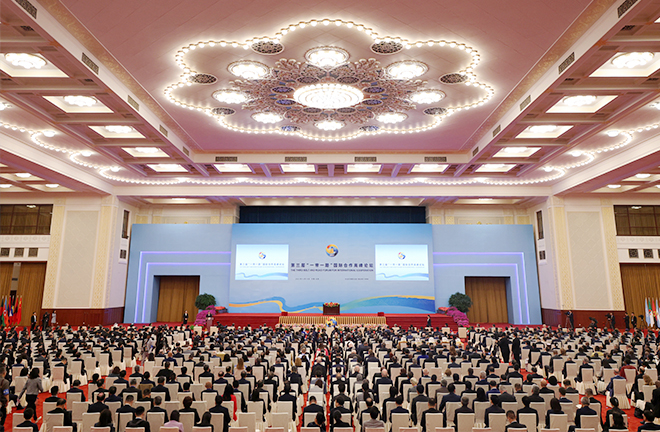Reconstruction of development knowledge

The Third Belt and Road Forum for International Cooperation was convened on Oct. 18 in Beijing. Photo: Jiang Qiming/CNSphoto
The emergence of new international development communities is an ongoing phenomenon in today’s world. The reconstruction of development knowledge is a core issue in international development cooperation and governance in the 21st century. This process will determine how we envision development and how we address the interplay between national and international development.
Crisis of traditional knowledge
American sociologist Immanuel Wallerstein argued that the interest in development issues was a major invention of social science research in the 19th and 20th centuries. Due to this very invention, a dichotomy has been gradually formed between the global North, centered around Europe and the United States, and the peripheral global South, consisting of developing countries. This division has had a significant impact on how international development is conceptualized and how development policies are formulated.
The global North has historically been the main driving force behind development, with its agenda setting, use of discourse, coordination of organizations, and funding largely coming from multilateral and bilateral organizations, research institutions, and social forces dominated by the North. However, this traditional development knowledge system is facing unprecedented challenges.
First, the functioning of development communities and the accumulation of development knowledge have fundamentally relied on the economic power of the leading countries, but this foundation is being shaken.
Second, the BRICS countries have accumulated rich development resources and experience over decades. The diverse development mechanisms and paths chosen by those countries based on their own culture and histories have become important sources of new development knowledge.
Third, the diversity of development concepts and the differences in development stages of different countries are often overlooked, leading to the ossification of traditional development knowledge.
Fourth, under the influence of political polarization, the governing bodies of global development have lost trust in each other, resulting in continuous marginalization of development issues.
Construction of new knowledge
The academic community is now advocating for the construction of new development knowledge, which is fundamentally a process of mutual examination and co-construction.
Firstly, development issues are not exclusive to the global South, and the North is also facing increasingly complex development challenges. Global development solutions, knowledge and experience are not solely concentrated in the North but are also abundant in the South.
Secondly, in the past five years, many scholars in Western countries have deliberately re-introduced decolonization studies and further reflected upon enduring colonial relations. This has opened up new possibilities for the reconstruction of development knowledge.
Thirdly, since the mid-1990s, the field of international development has realized that “development” involves both “big development,” prioritizing development intervention and “small development,” emphasizing social transformation itself. Research on the transformation of “big” and “small” development is becoming increasingly important, as it provides insights into how aid resources can be effectively used as catalysts to enhance the internal drive for development in developing countries. At the policy level, this has shifted the focus of the international development system from aid effectiveness towards development effectiveness.
Fourthly, in recent years, developing countries have been more active in advancing new development knowledge. It has long been difficult to establish a unified database for South-South cooperation due to limited resources, and relatively limited efforts have been made in terms of formulation of norms, monitoring, evaluation, and common language. Since the beginning of the 21st century, an increasing number of developing countries are attaching greater importance to discourse and knowledge systems.
China’s experience
China, as the largest developing country globally, has successfully eradicated extreme poverty within its borders. Moreover, China has put forth several significant initiatives, including the Belt and Road Initiative (BRI), the Global Development Initiative, the Global Security Initiative, and the Global Civilization Initiative. These initiatives demonstrate China’s active role in promoting the reconstruction of development knowledge, both domestically and internationally.
First, China’s experience in domestic development and poverty reduction is an important source of development knowledge innovation. The Chinese path to modernization reveals both the common characteristics of modernization worldwide and the distinctive features stemming from China’s own realities. The country has gained valuable macro-level experience in handling the relationships between government, market, and society, as well as specific experience in various areas such as agricultural transformation, industrialization, development of small and medium-sized enterprises, reform of state-owned enterprises, infrastructure construction, and the use of foreign investment.
Second, China has accumulated a wealth of new international development knowledge and channels of communication through overseas development practices. Since the late 1990s, with the implementation of the “going global” strategy and the introduction of the BRI in particular, Chinese development practitioners and social scientists have broadened their horizons and enriched their vision for new development paradigms.
Third, a multi-party approach plays a crucial role in building new development knowledge. Academic communities in both the Global North and the Global South are exploring new theories of development studies. However, it remains to be seen whether they can overcome geopolitical barriers and engage in effective dialogue. Against the backdrop of rising global challenges, responding to common risks to human society and promoting shared development have become a key orientation of new development knowledge.
Xu Xiuli and Li Xiaoyun are professors from the College of Humanities and Development Studies at China Agricultural University.
Edited by WANG YOURAN

 PRINT
PRINT CLOSE
CLOSE